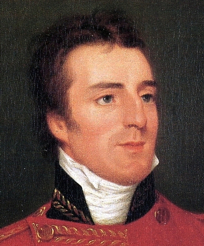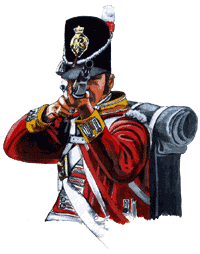The Iron Duke (1769 - 1852)

Field Marshal Arthur Wellesley, 1st Duke of Wellington, KG, GCB, GCH, PC, FRS, more commonly known as Wellington or "The Iron Duke." He defeated Frenchie and became Prime Minister.
The Duke of Wellington, perhaps Britain's greatest military hero was, in his mother's eyes, a disaster!
Arthur Wellesley was seen as an awkward child by his mother the Countess of Mornington. She declared, " I vow to God I don't know what I shall do with my awkward son Arthur". How wrong can a mother be?
His two older brothers had shone at school, Eton, and he had not, so he was sent as a last resort to a French Military Academy in the hope that he might become a 'passable' soldier. It took some years for his military talent to appear, but he was commissioned in 1787 and then became, with the help of his family's influence, and some years in Ireland, the Commander of the British forces against the Maratha Princes in India in 1803.
Wellesley returned home in 1805 with a knighthood and married his childhood sweetheart, Kitty Packenham, and entered the House of Commons.
At this time, the British contribution to the war against Napoleon had consisted mainly of successful Naval engagements, but the Peninsular War engaged the British army on a much greater scale. This war was to make Arthur Wellesley a hero.
He went to Portugal in 1809 and with the help of the Portuguese and Spanish guerrillas, expelled the French in 1814 and pursued the enemy into France. Napoleon abdicated and was sent into exile on the island of Elba.
The following year Napoleon escaped from Elba and returned to France where he resumed control of the government and army.

A member of the 33rd Regiment of Foot Wellingtons Redcoats who fought in actions against Napoleonic forces between 1812 - 1816
In 1815 Arthur Wellesley was made the first Duke of Wellington and marched his troops into Belgium where Napoleon had gathered his army. At a place called Waterloo the French and British armies met for what was to be the final battle. Wellington inflicted an overwhelming defeat on Napoleon, but the victory cost a staggering number of lives. Wellington had become known as the 'Iron Duke' by his men, but even the Iron Duke wept when he learned of the numbers of men slaughtered that day. The British had suffered 15,000 casualties and the French 40,000. Before the battle Wellington is reputed to have said of his own troops "This army is composed of the scum of the earth, I don't know what effect these men will have on the enemy, but by God they terrify me!"
This was to be Wellington's last battle. He returned to England and took up his political career again, eventually becoming Prime Minister in 1828.
The Duke was not a man to be dominated or threatened by anyone and his reply to a discarded mistress, who threatened to publish the love-letters he had written to her, was "Publish and be damned!"
Queen Victoria relied on him greatly, and when she was concerned about the sparrows that had nested in the roof of the partly finished Crystal Palace, she asked his advise as to how to get rid of them.
Wellington's reply was succinct and to the point, "Sparrow-hawks, Ma,am". He was right, by the time the Crystal Palace was opened by the Queen, they had all gone!
He died at Walmer Castle in Kent in 1852 and was given the honour of a State Funeral. It was a magnificent affair, a fitting tribute to a great military hero. The Iron Duke is buried in St. Paul's Cathedral next to another British hero, Admiral Lord Nelson.
Wellington's mother could not have been more wrong about her youngest son!
© E.P.C
http://www.historic-uk.com/HistoryUK/England-History/IronDuke.htm

Field Marshal Arthur Wellesley, 1st Duke of Wellington, KG, GCB, GCH, PC, FRS, more commonly known as Wellington or "The Iron Duke." He defeated Frenchie and became Prime Minister.
The Duke of Wellington, perhaps Britain's greatest military hero was, in his mother's eyes, a disaster!
Arthur Wellesley was seen as an awkward child by his mother the Countess of Mornington. She declared, " I vow to God I don't know what I shall do with my awkward son Arthur". How wrong can a mother be?
His two older brothers had shone at school, Eton, and he had not, so he was sent as a last resort to a French Military Academy in the hope that he might become a 'passable' soldier. It took some years for his military talent to appear, but he was commissioned in 1787 and then became, with the help of his family's influence, and some years in Ireland, the Commander of the British forces against the Maratha Princes in India in 1803.
Wellesley returned home in 1805 with a knighthood and married his childhood sweetheart, Kitty Packenham, and entered the House of Commons.
At this time, the British contribution to the war against Napoleon had consisted mainly of successful Naval engagements, but the Peninsular War engaged the British army on a much greater scale. This war was to make Arthur Wellesley a hero.
He went to Portugal in 1809 and with the help of the Portuguese and Spanish guerrillas, expelled the French in 1814 and pursued the enemy into France. Napoleon abdicated and was sent into exile on the island of Elba.
The following year Napoleon escaped from Elba and returned to France where he resumed control of the government and army.

A member of the 33rd Regiment of Foot Wellingtons Redcoats who fought in actions against Napoleonic forces between 1812 - 1816
In 1815 Arthur Wellesley was made the first Duke of Wellington and marched his troops into Belgium where Napoleon had gathered his army. At a place called Waterloo the French and British armies met for what was to be the final battle. Wellington inflicted an overwhelming defeat on Napoleon, but the victory cost a staggering number of lives. Wellington had become known as the 'Iron Duke' by his men, but even the Iron Duke wept when he learned of the numbers of men slaughtered that day. The British had suffered 15,000 casualties and the French 40,000. Before the battle Wellington is reputed to have said of his own troops "This army is composed of the scum of the earth, I don't know what effect these men will have on the enemy, but by God they terrify me!"
This was to be Wellington's last battle. He returned to England and took up his political career again, eventually becoming Prime Minister in 1828.
The Duke was not a man to be dominated or threatened by anyone and his reply to a discarded mistress, who threatened to publish the love-letters he had written to her, was "Publish and be damned!"
Queen Victoria relied on him greatly, and when she was concerned about the sparrows that had nested in the roof of the partly finished Crystal Palace, she asked his advise as to how to get rid of them.
Wellington's reply was succinct and to the point, "Sparrow-hawks, Ma,am". He was right, by the time the Crystal Palace was opened by the Queen, they had all gone!
He died at Walmer Castle in Kent in 1852 and was given the honour of a State Funeral. It was a magnificent affair, a fitting tribute to a great military hero. The Iron Duke is buried in St. Paul's Cathedral next to another British hero, Admiral Lord Nelson.
Wellington's mother could not have been more wrong about her youngest son!
© E.P.C
http://www.historic-uk.com/HistoryUK/England-History/IronDuke.htm